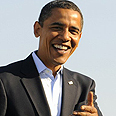
Official: Obama won’t press Israel in coming months
Diplomatic source says president-elect will change US policies in Middle East, but not before he tackles bigger domestic problems, such as ailing economy. 'I don’t think we should be concerned over Obama's election, it may do Israel good,' he says
Israel stands to have about six months before it has to contend with US president-elect Barack Obama's new foreign policy, which will undoubtedly affect Jerusalem, a senior diplomatic source said Tuesday.
After an initial assessment of the historical presidential elections which took place on November 4, Jerusalem is said to believe that Obama will change his country's Middle East policies – a move which may prove detrimental to Israel.
Obama's future presidency was welcomed by top Israeli officials Wednesday, with the belief that the president-elect understands the bond between Israel and the US, and sees Israel as a strategic partner in the Middle East.
Nevertheless, the Obama administration is likely to "sing a different tune" when it comes to foreign policy, especially where Iran and Syria are concerned.
As the winner of the 2008 US presidential race became apparent, the Prime Minister's Office, as well as the Defense and Foreign ministries, called a series of meetings to discuss the upcoming changes in Washington.
The meetings were hailed as brainstorming sessions, meant to prepare for January 20th – the day Barack Obama will step into the White House as the president of the United States. No definitive conclusions were reached at this point.
Priorities. Obama at victory rally in Chicago (Photo: Reuters)
One official made it clear that the Obama is expected to change the US' approach to the Middle East, including the launching of more extensive talks with Iran in an effort to curb its nuclear enrichment program.
"Israel can view this as an opportunity to stop Tehran's nuclear enrichment process; but in any case Obama will not accept an Iran with military nuclear capabilities," he said.
As for Syria, the official said that the Obama administration will give Damascus an opportunity to sever its ties to the "axis of evil" while conducting direct negotiations.
With regards to Hamas, diplomatic officials in Jerusalem said the US' stance is not expected to change dramatically, meaning it will support Hamas' isolation until it accepts the Mideast Quartet's conditions.
"No matter how you look at it, Israel has enough time to prepare for the change in Washington's policies," one official said. "Obama has bigger problems to tackle at this point – such as the economy. In any case we believe he will wait to see the results of the general elections in Israel (February 10).
"I don’t think we should be concerned over Obama's election, it may do Israel good," he said.
US Secretary of State Condoleezza Rice is expected to arrive in the Middle East Thursday afternoon ahead of Sunday's meeting of Quartet leaders in Sharm el-Sheikh to mark one year since the Annapolis Summit.
Rice, who will also meet with senior Israeli officials, is still looking to advance the Israeli-Palestinian negotiations before Bush leaves office.











